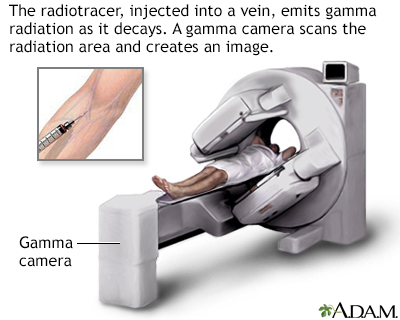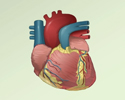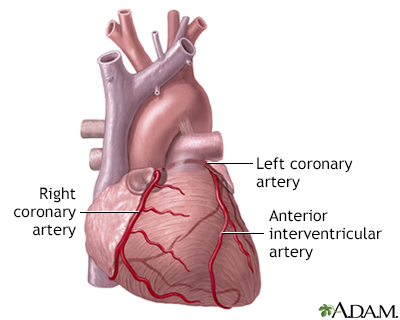Nuclear stress test
Nuclear stress test is an imaging method that uses radioactive material to show how well blood flows into the heart muscle, both at rest and during activity.
Nuclear stress test - Animation
Your heart is the engine that keeps blood pumping throughout your body. When your heart doesn't work as well as it should, your body can't function normally. If you've had heart problems in the past, your doctor may recommend that you have a test to see how well your blood is flowing into your heart. Let's talk today about thallium and sestamibi stress test, also known as nuclear stress test. This is your heart. It's job is to receive oxygen-poor blood from your body, send it to your lungs to pick up fresh oxygen, then pump that oxygen-rich blood back out to your body. When your heart doesn't get enough blood, it can't work as well as it should. So, why would you need a thallium or sestamibi stress test? Well, your doctor may recommend that you have this test to find out why you're having chest pain, find out which treatment is best for your heart disease, check whether a treatment you've already had, such as medicine or surgery, is working, or see if you have coronary artery disease. So, what happens during the stress test? Well, you'll start to prepare for the stress test a day ahead of time. Don't eat anything the night before the test, and avoid any foods that contain caffeine for a full day beforehand. You'll have to skip your morning cup of coffee or tea, and avoid sodas and chocolate. Your doctor will let you know if you need to stop taking any of your medicines before the test. When you arrive at the doctor's office or medical center for the test, an intravenous, or IV line will be placed into your vein. Through this line, a weakly radioactive substance will be injected into one of your veins. You'll lie down and wait for 15 to 45 minutes, and a special camera will take pictures as the thallium or sestamibi substance moves into your heart during a period of rest. Then you'll walk on a treadmill with EKG electrodes monitoring your heart activity. Once you've reached your maximum level of exercise you'll get another injection of the radioactive substance and your heart will be scanned to see how well the blood is flowing during a period of stress. If you can't exercise, you'll get a drug that will simulate the effects of exercise by making your heart beat faster. During the test, some people feel chest pain, shortness of breath, dizziness, or a fast heartbeat. Let the person who is doing the test know right away if you don't feel well. So, what do the test results mean? Well, your doctor will compare the first set of images to the second set, to see if you have heart disease or your heart disease is getting worse. If blood is flowing well through the arteries of your heart, then your test is normal. If blood isn't flowing well, you may have a blockage in one or more of the coronary arteries of your heart. In that case, you may need to have another test, or an angiography, stent or heart bypass surgery to open up a blocked artery. A stress test can help your doctor see how well your heart is working. Then, you can find out together which treatments you'll need to get your blood pumping smoothly again.
How the Test is Performed
This test is done at a medical center or health care provider's office. It is done in stages:
You will have an intravenous (IV) line started.
- A radioactive substance, such as thallium or sestamibi, will be injected into one of your veins.
- You will lie down and wait for between 15 and 45 minutes.
- A special camera will scan your heart and create pictures to show how the substance has traveled through your blood and into your heart.
Most people will then walk on a treadmill (or pedal on an exercise machine).
- After the treadmill starts moving slowly, you will be asked to walk (or pedal) faster and on an incline.
- If you are not able to exercise, you may be given a medicine called a vasodilator (such as adenosine or dipyridamole [persantine]). This medicine widens (dilates) your heart arteries.
- In other cases, you may get a medicine (dobutamine) that will make your heart beat faster and harder, similar to when you exercise.
Your blood pressure and heart rhythm (electrocardiogram - ECG) will be monitored throughout the test.
Electrocardiogram - ECG)
An electrocardiogram (ECG) is a test that records the electrical activity of the heart.

When your heart is working as hard as it can, a radioactive substance is again injected into one of your veins.
- You will wait for 15 to 45 minutes.
- Again, the special camera will scan your heart and create pictures.
- You may be allowed to get up from the table or chair and have a snack or drink.
Your provider will compare the first and second set of pictures using a computer. This can help detect if you have heart disease or if your heart disease is becoming worse.

Nuclear scan
A radiotracer is injected into a peripheral vein. As the radiotracer decays, gamma radiation is emitted and is detected by a Gamma camera. When the tracer has collected in the target organ the area is scanned. Radionuclide scans can detect abnormalities such as fractures, bone infections, arthritis, rickets, and tumors that have spread, among other diseases.
How to Prepare for the Test
You should wear comfortable clothes and shoes with non-skid soles. You may be asked not to eat or drink after midnight. You will be allowed to have a few sips of water if you need to take medicines.
You will need to avoid caffeine for 24 hours before the test. This includes:
- Tea and coffee
- All sodas, even ones that are labeled caffeine-free
- Chocolates, and certain pain relievers that contain caffeine
Many medicines can interfere with blood test results.
- Your provider will tell you if you need to stop taking any medicines before you have this test.
- Do not stop or change your medicines without talking to your provider first.
How the Test will Feel
During the test, some people feel:
- Chest pain
- Fatigue
- Muscle cramps in the legs or feet
- Shortness of breath
If you are given the vasodilator medicine, you may feel a sting as it is injected. This is followed by a feeling of warmth. Some people also have a headache, nausea, and a feeling that their heart is racing.
If you are given medicine to make your heart beat stronger and faster (dobutamine), you may have a headache, nausea, or your heart may pound faster and more strongly.
Rarely, during the test people experience:
- Chest discomfort
- Dizziness
- Palpitations
Palpitations
Palpitations are feelings or sensations that your heart is pounding or racing. They can be felt in your chest, throat, or neck. You may:Have an unpl...
 ImageRead Article Now Book Mark Article
ImageRead Article Now Book Mark Article - Shortness of breath
If any of these symptoms occur during your test, tell the person performing the test right away.
Why the Test is Performed
The test is done to see if your heart muscle is getting enough blood flow and oxygen when it is working hard (under stress).
Your provider may order this test to find out:
- How well a treatment (medicines, angioplasty, or heart surgery) is working.
- If you are at high risk for heart disease or complications.
- If you are planning to start an exercise program or have surgery.
- The cause of new chest pain or worsening angina.
- What you can expect after you have had a heart attack.
Heart attack
Most heart attacks are caused by a blood clot that blocks one of the coronary arteries. The coronary arteries bring blood and oxygen to the heart. ...
 ImageRead Article Now Book Mark Article
ImageRead Article Now Book Mark Article
The results of a nuclear stress test can help:
- Determine how well your heart is pumping
- Determine the proper treatment for coronary heart disease
Coronary heart disease
Coronary heart disease is a narrowing of the blood vessels that supply blood and oxygen to the heart. Coronary heart disease (CHD) is also called co...
 ImageRead Article Now Book Mark Article
ImageRead Article Now Book Mark Article - Diagnose coronary artery disease
- See whether your heart is too large
Normal Results
A normal test most often means that you were able to exercise as long as or longer than most people of your age and sex. You also did not have symptoms or changes in blood pressure, your ECG or the images of your heart that caused concern.
A normal result means blood flow through the coronary arteries is probably normal.
The meaning of your test results depends on the reason for the test, your age, and your history of heart and other medical problems.
What Abnormal Results Mean
Abnormal results may be due to:
- Reduced blood flow to a part of the heart. The most likely cause is a narrowing or blockage of one or more of the arteries that supply your heart muscle.
- Scarring of the heart muscle due to a previous heart attack.
After the test you may need:
- Angioplasty and stent placement
Angioplasty and stent placement
The blood vessels that bring blood to your brain and face are called the carotid arteries. You have a carotid artery on each side of your neck. The...
 ImageRead Article Now Book Mark Article
ImageRead Article Now Book Mark Article - Changes in your heart medicines
- Coronary angiography
Coronary angiography
Coronary angiography is a procedure that uses a special dye (contrast material) and x-rays to see how blood flows through the arteries in your heart....
 ImageRead Article Now Book Mark Article
ImageRead Article Now Book Mark Article - Heart bypass surgery
Heart bypass surgery
Heart bypass surgery creates a new route, called a bypass, for blood and oxygen to go around a blockage to reach your heart.
 ImageRead Article Now Book Mark Article
ImageRead Article Now Book Mark Article
Risks
Complications are rare, but may include:
- Arrhythmias
Arrhythmias
An arrhythmia is a disorder of the heart rate (pulse) or heart rhythm. The heart can beat too fast (tachycardia), too slow (bradycardia), or irregul...
 ImageRead Article Now Book Mark Article
ImageRead Article Now Book Mark Article - Increased angina pain during the test
- Breathing problems or asthma-like reactions
- Extreme swings in blood pressure
- Skin rashes
Your provider will explain the risks before the test.
Considerations
In some cases, other organs and structures can cause false-positive results. However, special steps can be taken to avoid this problem.
You may need additional tests, such as cardiac catheterization, depending on your test results.
Cardiac catheterization
Cardiac catheterization involves passing a thin flexible tube (catheter) into the right or left side of the heart. The catheter is most often insert...

Reviewed By
Michael A. Chen, MD, PhD, Associate Professor of Medicine, Division of Cardiology, Harborview Medical Center, University of Washington Medical School, Seattle, WA. Also reviewed by David C. Dugdale, MD, Medical Director, Brenda Conaway, Editorial Director, and the A.D.A.M. Editorial team.
Balady GJ, Ades PA. Exercise physiology and exercise electrocardiographic testing. In: Libby P, Bonow RO, Mann DL, Tomaselli GF, Bhatt DL, Solomon SD, eds. Braunwald's Heart Disease: A Textbook of Cardiovascular Medicine. 12th ed. Philadelphia, PA: Elsevier; 2022:chap 15.
Dorbala S, DiCarli MF. Nuclear cardiology. In: Libby P, Bonow RO, Mann DL, Tomaselli GF, Bhatt DL, Solomon SD, eds. Braunwald's Heart Disease: A Textbook of Cardiovascular Medicine. 12th ed. Philadelphia, PA: Elsevier; 2022:chap 18.
Gulati M, Levy PD, Mukherjee D, et al. 2021 AHA/ACC/ASE/CHEST/SAEM/SCCT/SCMR Guideline for the evaluation and diagnosis of chest pain: a report of the American College of Cardiology/American Heart Association Joint Committee on clinical practice guidelines. Circulation. 2021;144(22):e368 e454. PMID: 34709879 pubmed.ncbi.nlm.nih.gov/34709879/.
Morrow DA, de Lemos JA. Stable ischemic heart disease. In: Libby P, Bonow RO, Mann DL, Tomaselli GF, Bhatt DL, Solomon SD, eds. Braunwald's Heart Disease: A Textbook of Cardiovascular Medicine. 12th ed. Philadelphia, PA: Elsevier; 2022:chap 40.
Virani SS, Newby LK, Arnold SV, et al. 2023 AHA/ACC/ACCP/ASPC/NLA/PCNA guideline for the management of patients with chronic coronary disease: a report of the American Heart Association/American College of Cardiology Joint Committee on Clinical Practice Guidelines. Circulation. 2023;148(9):e9–e119. PMID: 37471501 pubmed.ncbi.nlm.nih.gov/37471501/.


 All rights reserved.
All rights reserved.